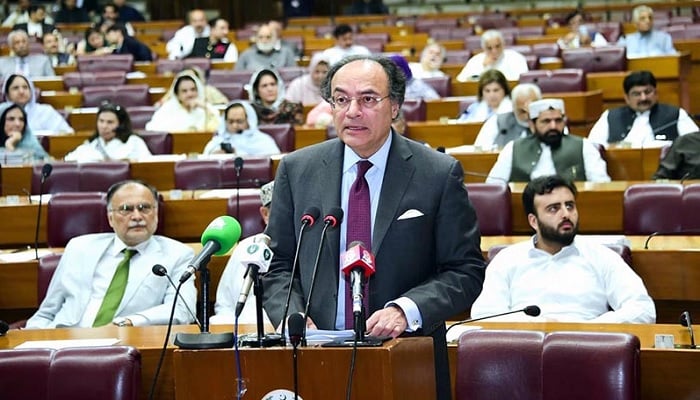'Non-filers to be given personal hearing before SIM blockage, travel ban'
Budget aims at narrowing fiscal deficit by expanding revenues and cutting unnecessary expenditures, finance minister says
The government has decided to incorporate the Senate’s proposal to provide an opportunity for non-filers to have a personal hearing before measures such as SIM blockage and a ban on foreign travel were implemented, Finance Minister Senator Muhammad Aurangzeb said on Tuesday.
Concluding the discussion on the budget 2024-25 in the National Assembly, the former banker appreciated the recommendations presented by the Senate for inclusion in next fical year’s budget.
In the Finance Bill 2024, the government has proposed to ban non-filers from traveling overseas and block their SIM cards, aiming to encourage citizens to become filers — a move that has sparked a debate over its practicality.
He said the budget for the next fiscal year was aimed at narrowing the fiscal deficit by expanding the government's revenues and cutting unnecessary expenditures.
The Pakistan Muslim League-Nawaz (PML-N) led coalition government is striving to meet the prerequisites for an additional — longer and larger — International Monetary Fund (IMF) programme, by setting a high tax revenue target taking a shot at lowering the fiscal deficit from 7.4% to 5.9%.
It is believed that streamlining the tax collection processes and broadening the tax base would help achieve these fiscal targets.
Pakistan has set a challenging tax revenue target of Rs13 trillion for the year starting July 1, a near 40% jump from the current year to strengthen the case for a new bailout deal with the lender of the last resort. The ambitious revenue targets are in line with analyst expectations.
Following the prime minister's directives, the emphasis on simplicity and austerity would continue into the next fiscal year, the finance minister said.
The finance czar mentioned that a committee, headed by him, had been formed to present recommendations, including the closure or merger of ministries and their devolution to the provinces.
He announced that future pension expenditures would be reduced through pension reforms.
Senator Aurangzeb highlighted that the home-grown reforms programme formed the basis of next year’s budget to navigate the country through its challenging economic situation.
He said the reforms included increasing the tax-to-GDP ratio to 13%, state-owned enterprises (SOE) reforms, public-private partnerships, and energy sector reforms.
The minister affirmed the government’s serious commitment to this plan and noted that its implementation had already begun. He assured that all stakeholders would be consulted throughout this process.
He said that the digitisation of the Federal Board of Revenue (FBR) was being expedited and that legislation was being introduced in Parliament to reform the boards of the power sector. The privatisation of Pakistan International Airlines (PIA) had also progressed, he added.
Highlighting other aspects of the home-grown reforms plan, Senator Aurangzeb mentioned targeted social protection, a broad-based fair taxation system, and initiatives for the health and education sectors, including skills development.
He announced that stationery items would remain exempt from tax and that the current reduced rates for hybrid-electric vehicles would remain unchanged.
Under the Export Facilitation Scheme (EFS) 2021 policy, he said, zero-rating for local suppliers was not being abolished.
The finance minister emphasised that the agriculture, education, and health sectors had been prioritised, while proposals such as exempting charity hospitals from sales tax would be given serious consideration.
The former banker noted that the government was fast-tracking reforms in the FBR, with seven billion rupees allocated in the budget for this purpose.
He said action would be taken from July 1st against retailers who failed to register with the FBR Tajir Dost Scheme.
Regarding the defence budget, the finance minister acknowledged the immense sacrifices made by the armed forces in defending the country and their readiness to meet internal and external threats.
He emphasised that national security was the foremost priority and assured that the armed forces would be provided with the necessary resources.
The finance minister announced honoraria equivalent to three months' basic pay for various departments, including the staff of the National Assembly, Senate, Press Information Department (PID), Radio Pakistan, Pakistan Television (PTV), and Associated Press of Pakistan (APP), who performed duties in the Parliament House during the budget session.
-
Bitcoin plummets toward $60,000 as investors dump risky bets
-
Bitcoin crashes below $63K as regulatory pressure and market fears grow
-
Bitwise Crypto Industry innovators ETF: What investors should do in 2026?
-
Nintendo shares slide again as momentum fears grow
-
Gold, silver prices fallen sharply; What’s driving the drop?
-
Gold’s record climb: Experts question if its safety is ‘overstated’
-
Dubai unveils plans to construct street built with real gold
-
Netflix slams Paramount’s bid: 'Doesn't pass sniff test’ as Warner battle escalates












